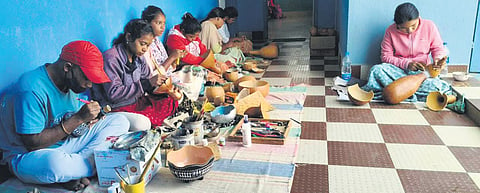

RAYAGADA: Dry bottle gourds, or Tumba in local parlance, never go waste in Rayagada. Traditionally, Kondh farmers of the district used dry gourd shells as containers to drink water, ‘mandia jau’ or even the local brew but today, these shells are statement pieces of fine art in urban households.
The contemporary twist is the contribution of Himanshu Sekhar Pandia, a Rayagada-based master craftsman. He not only introduced Odisha to tumba craft and built a tribal economy around it but has also been training tribals and non-tribals in it for close to two decades through his Prerana Art and Craft centre. The craft was included in the state’s official list of handicrafts by the department of Handloom, Textile and Handicraft last year, thanks to Pandia’s unrelenting efforts.
Every year, he trains around 25 to 30 tribal and non-tribal people in the craft, an initiative that is supported by DC(Handicrafts) and the State government. It includes functional and decorative pieces like lamp shades, sculptures, jewellery, toys, crockery products and much more. Back in the early 2000, during a trip to Rayagada, Pandia saw some tribal farmers carrying water in tumba shells to their farms. A diploma holder in fine arts, he decided to refine the hard, dried bottle gourd shells to prepare functional pieces. Before carving, chiselling or painting motifs on them, the hollowed, dry shells are sorted as per their size, cleaned and scrubbed with sandpaper.
“So far, I have trained close to 600 people in this craft and during the training period, which lasts from three months to one year, the trainees get a monthly remuneration of Rs 6,000 which is funded by the government,” he said. The trainees are mostly women from villages nearby Rayagada.
But tumba is not just a craft today, it is also a story of livelihood. Every summer, Pandia and his team move from one village to another to collect shells from tribals, particularly Kondhs who grow them in abundance. There are around 1,800 to 2,000 tribals in 18 villages who supply the shells to him and the price of each dry shell varies from Rs 10 to Rs 200, depending on the size. From March to May, Pandia collects 25 to 27 truck loads of shells from them.
“Tribals here grow various kinds of gourds for their consumption. Back in 2001 when I started working on this craft, I approached many tribal farmers to source the raw material. Growing tumba does not take much maintenance or investment. They used to sell one bottle gourd for Rs 10 but I offered them Rs 20 for a dried one which became an additional income for them. This is how they started growing it for craft purposes,” he recalled.
Every year, tribals save the bottle gourd seeds and sow them in forests. After plucking the ones meant for their own consumption, they leave the rest to ripen and supply the dry shells to Pandia.
The master craftsman has a unique approach to the craft. With bottle gourds varying in shapes and sizes, he designs each piece as per the shape of the gourd. Extremely light in weight, tumba craft sells at a premium in Bhubaneswar, Delhi, Kolkata and Bengaluru markets. Some of it is exported too. The spike in demand, Pandia explained, is because the craft is not just beautiful but also eco-friendly and biodegradable.
“Currently, tumba craft products are selling like hot cakes because people are looking for sustainable alternatives even in the home decor section,” he said. State’s agencies like ORMAS, DC(Handicrafts) and the department of Mission Shakti also provide him market link for tumba crafts through exhibitions both within and outside the state.